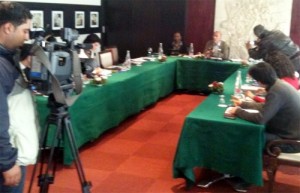Tunisia’s post-revolution spring has brought joy and genuine empowerment to the Tunisian people, but as the extent of corruption and abuse of power is revealed, a sense of bitterness and bewilderment at how a system could fail so utterly, is emerging in the Tunisian society.
The issue now is not retribution but reconstruction of a functioning political system, this time on an inclusive and transparent basis.
This April my colleagues and I went to Tunisia to get a general impression of how the country had changed since the days of Ben Ali, to hear what the people were saying and what they wanted, to gauge the space that had been opened for civil society and to understand the role that corruption is playing in current political discourse.
Although we talked to various government and international stakeholders in the country, our focus was on civil society organizations and individuals.
The response was so overwhelming that my colleagues and I split up for meetings, meeting in the evenings to compare notes.We were profoundly impressed by the will and the vibrancy of the people that we spoke to.
After 3 decades of repression, Tunisian civil society is anything but beaten and is now determined to make itself heard.
Organisations such as the Ligue Tunisienne de droits de l’homme and the Association Tunisienne des Femmes Democrates, activists such as Slim Boukhir, and various bloggers and young people all provided excellent analyses of the current situation, and realistic suggestions of how civil society could contribute to the new Tunisia.
A lasting impression was left by the women of the Association Tunisienne des Femmes Democrates, who invited us to a meeting that they held with over 700 of their members. Not only the number of participants but also the energy and the confidence that exuded from the meeting was striking. Educated, eloquent and efficient, it wasn’t only the intellectual strength of these women that impressed us, but also their unflinchingly practical approach to the obstacles posed by post-revolution Tunisia.
When our taxi ground to a halt in the dead snarl of traffic in Tunis’ main square, my companion seized my arm and pulled me out of the car. “We’ll be quicker walking,” she explained, as she led me through busy roads and alleys to our next destination. The coolness with which she conducted our next appointment revealed nothing of the hot dusty march that had left me red-faced and breathless.
In other meetings we heard the stories of oppression and stifling indifference that had characterised the regime’s relationship with civil society in Tunisia.
Now that the dictatorship is over, there is a huge need to talk and to share past experiences. Along with resentment, that the international community left civil society alone for so long in Tunisia, there is hope and enthusiasm for cooperation.
Despite all the optimism, the overriding impression that we took with us was one of fragility. There is genuine hope in the streets of Tunis, and real commitment to change. But the challenge of responding to short-term demands for change and for justice whilst also providing a basis for long-term stability and integrity, is a big one.
Tunisia has invited the international community to help them address their needs. If we fail this time – if the new system can’t provide a safeguard against corruption and abuse of power – the frustration and isolation of the Tunisian people will be even worse than under Ben Ali.
Chantal Uwimana is TI’s regional director for Africa and the Middle East
















 Connect with us on Facebook
Connect with us on Facebook Follow us on Twitter
Follow us on Twitter